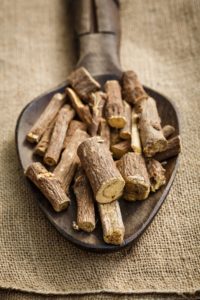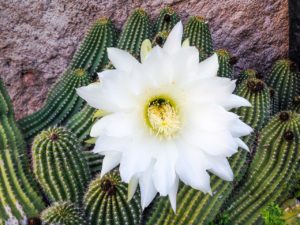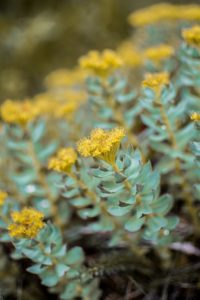Anxiety and Stress:
Adaptogens Versus Medications for Relief
When my son was going through major mental health and physical issues, I found myself getting run down and sick all the time with long recovery times. I was exhausted, my blood pressure was 88/58 (that is very low!), and even little stressors were starting to affect me.
Bottom line: I was stressed to the max!
We’ve all been there, whether it is work, taking care of an ill loved one, no down time, family issues, money issues and the list goes on and on. We have more stress in our daily lives than we can handle. Hopefully the stress passes, but if you are like many others, the stress is long lasting.
When this happens, your body gets impacted in many ways. Suddenly you may need more caffeine to get through your day, or you are tired all the time, or maybe you are craving sugar and carbs.
Stress can turn into anxiety. Perhaps little life stressors that didn’t bother you before now seem overwhelming to handle. Now you worry constantly. Anxiety can take on many forms, from the constant worry to panic and anxiety attacks to obsessive compulsive disorder.
I became a nutritionist because of my son. I had my first ah ha moment in nutrition school when the instructor discussed stress, anxiety, the adrenals and how adaptogen herbs can support our bodies when we are under this constant stress. It was fascinating to learn that certain herbs can help your body adapt to the stress you are under!
Stress is a natural part of life. But it should come in waves. Your stress levels go up, then come back down. In our current society, often our stress level goes up yet never comes down or may come down but never back down to baseline. This means that your body is constantly producing cortisol. When this happens you may start to exhibit the signs and symptoms of stress and anxiety.
This is where adaptogen herbs can help. Since I learned about them I have been taking them to help support my body during times of heightened stress and anxiety and recommend them to my clients who experience stress, anxiety and sleep issues.
Not Sure if You Are Stressed?
Here are Some Symptoms
If stress and anxiety are causing your symptoms, it may be useful to address the stress and anxiety versus all the symptoms with medications such as a medication for sleep, more and more caffeine to combat fatigue, medication for joint pain and so forth.
- Anxiety
- Fatigue
- Insomnia
- Stomach issues/digestive issues
- Irritability
- Racing heart
- Rapid breathing
- Shortness of breath
- Alcohol abuse
- Sexual dysfunction
- Joint pain
- Headaches
- High blood pressure
- Ulcers
- Depression
- Slow wound healing
- Skin issues
- Impaired work performance
- Slow to recover from exercise workouts
(12)
Medications for Stress and Anxiety:
What You Need to Know
I am not a medical professional so obviously if you are thinking about using meds to reduce your anxiety and stress level, you need to discuss this with your doctor. But what I have found is that doctors don’t always give you the information you need about drugs to make an informed decision.
Benzodiazepines are often prescribed for anxiety and sleep issues associated with stress and anxiety or when you are under a great deal of stress and are having difficulty coping and functioning.
You should avoid alcohol and St. Johns wort when on these drugs (1). St. John’s wort can speed the liver clearance of your medications and thus you may have less in your system enabling the drug to not be as effective. (5)
It is ironic that benzos can be used as a sleep aid because in fact, these drugs can deplete your endogenous melatonin which helps you to sleep. They can also deplete calcium absorption but do so by increasing your metabolism of vitamin D (2). (vitamin D is needed for calcium absorption-think of it as the taxi cab and calcium as the passenger).
Benzo medications will also deplete your B vitamin levels especially B2, B6, B12 and folate. This is ironic too, because during times of heightened stress, your body uses up your B’s more rapidly, so taking a Benzo will only exacerbate your depletion.
They can also deplete your vitamin K and biotin levels. (3) You need vitamin K for heart health, but it is also needed for calcium absorption along with vitamin D. (as mentioned, vitamin D is the taxi cab, and calcium is the passenger, vitamin K is the driver, telling the calcium where it needs to go).
Benzo Drugs, SSRI’s and Side Effects
Benzo drugs for stress and anxiety can have a calming effect, but they are also highly addictive. Benzodiazepines may help you in the short term, but you need to think long term, of the side effects and the issues you face when you want to taper off these drugs (with your doctors’ guidance).
However, when you decide you want to taper off, don’t be surprised that your doctor does not have a reliable taper process on hand. Unfortunately, there is very little data, nor randomized trials looking at the taper process effectiveness. Most doctors will tell you that the taper process can be long (a year) and with side effects. (6) Long term use of this class of drugs can cause dependence and the withdrawal effects can be severe and can last for months. (4)
When benzos are used to treat insomnia, the helpful effects can wear off after a few weeks (4). It can help you to sleep but studies show that it can reduce stage 3-4 sleep (7), your deep sleep. In my professional experience, I have heard from those who use these drugs, state that they still don’t feel well rested even though they slept through the night.
You should be aware of the more common side effects if you do choose to take these drugs. Side effects can include cognitive impairment, drowsiness, impaired reaction time, motor incoordination, increase of car accidents, and increase risk of hip fractures (4).
In addition to benzodiazepines for anxiety and stress related issues, your doctor may suggest an antidepressant as an alternative. You may think this may be a safer option, but anti-depressant medications come with a host of side effects as well and the taper process is also challenging.
The most common antidepressant drugs prescribed for anxiety and stress are the SSRI’s (selective serotonin reuptake inhibitors). For instance, Prozac, a common SSRI drug, can cause sexual dysfunction, dry mouth, insomnia, strange dreams, headaches, dizziness, visual disturbances, tremors, feeling anxious, upset stomach, loss of appetite (9) and the most concerning side effects include, suicidal ideation, suicide, violence and homicide. (10). Sadly, your doctor nor many medical sites online are not going to share these very concerning side effects with you.
Knowledge is power, so it is best to be informed about all your options if you are dealing with stress and anxiety in your life. The odds are your doctor will not tell you about herbs as an alternative, but most likely because he or she isn’t aware of the benefits of herbs. In addition to this, herbs are not addictive and while some may experience very mild side effects such as upset stomach, the herbs I am suggesting in this post will not cause dangerous harm that these medications may cause.
Safer Options:
Adaptogens
(As with any herbs, if you are on any medications, consult with your health care professional prior to adding an herb into your health regimen)
Your body is always trying to maintain balance, homeostasis. When you are stressed and feeling anxious, your body is out of balance. A medication will not encourage homeostasis, but an herb will.
Adaptogenic herbs will work with your body, not against it and will help the body to adapt to the stressors in your life. Not only will it help your body adapt to the stress, but it can also enhance your mood (9).
Most of us think of stress as the events that occur in our lives such as divorce, long work hours or death of a loved one, but don’t forget that during times of intense training and exercise, you can also benefit from the use of an adaptogens as this exercise is also perceived as stress to your body.
3 Adaptogenic Herbs to Try for Anxiety and Stress
Ashwagandha (Withania somniferum)
This plant is grown in mild and dry climates and has been used medicinally since ancient times. The root is the part used medicinally for stress and anxiety. (12)
It can support your immune function, balance cortisol levels and support cognition. (8) This is important because during times of stress and anxiety our cortisol levels may be too high or may end up depleted. Ashwagandha can help bring cortisol levels back in balance. Your immune function is also decreased during times of stress and therefore you may find yourself getting sick more often and slow to recover. Brain function can become impaired when under stress and many will say they feel like their brain is in a fog.
Take 500 mg. in capsule form, one to two times per day. The morning dose can help provide energy for your day and the second dose can help you to wind down and sleep at night. Avoid during pregnancy. (12)
Ashwagandha is a great herb to try if you feel you have nervous tension and need a calming Adaptogenic herb. It is also a very supportive herb if you have hypothyroidism or less than optimal thyroid function (subclinical hypothyroidism). (13)
Rhodiola rosea
Rhodiola has been used medicinally for centuries to enhance endurance, for fatigue, for nervous system disorders such as anxiety, and for immune support. There is evidence to support that Rhodiola is used for improving thyroid and adrenal function (12).
It can also be a wonderful herb to use to support your body if you are traveling to a place with a dramatic change in climate. For instance, if you are traveling to a place with cold temperatures and you live in a warmer climate, take Rhodiola to help your body adapt to the stress of the dramatic climate change. (13)
Rhodiola can reduce elevated cortisol levels while at the same time increase beneficial mood enhancing neurotransmitters, such as serotonin and dopamine. For this reason, Rhodiola can act as a natural anti-depressant (11).
There has been numerous double- blind studies that have shown the positive effects of rhodiola use for stress and anxiety. For instance, in a double- blind study, 100 mg of rhodiola extract was given to medical students daily during stressful exams. Those taking the extract reported a better sense of well-being and performed better on tests of mental and psychomotor performance. Another study, of military cadets performing 24- hour duty showed that 375 to 555 mg of rhodiola per day significantly reduced mental fatigue. (12)
Use lower amounts of rhodiola for a stimulating effect if you are feeling fatigue due to the stress you are under. Use higher amounts for anxiety to provide a more calming effect. For lower doses use 200-300 mg of standardized extract. For a calming effect use doses in the range of 500-600 mg. (12).
If you are an athlete or your teen plays sports at an intense and competitive level, this is a good herb to add in to support the body when under stress of intense training. For college and high school students, start adding in this herb two weeks prior to the start of exams or a standardized test if you experience stress or anxiety during exam. I wish I knew about these herbs during standardized tests. My heartbeat would be so rapid, my palms sweaty and when I looked at the questions it was like everything I ever learned was forgotten.
No side effects nor safety issues have been reported with rhodiola use (12). However, if on any medication, discuss it with your health care professional first.
Korean ginseng
This is also known as Asian ginseng or Panax ginseng. This is not the same herb as Siberian ginseng which is not technically a ginseng and is also known as eleuthero.
The root is used and preferably from plants that are older than six years old. Asian ginseng has been a part of Asian medicine for over 2,000 years. Ginseng is used to support the body when under stress and to support physical and intellectual performance (14). Both of which you may suffer from when under stress or when experiencing anxiety.
This is a stimulating herb so better for those with fatigue or chronic fatigue syndrome associated with their stress or anxiety. This is also a beneficial herb for the elderly, to promote mental and physical vitality. (14)
Take 200-500 mg of standardized root extract per day. This is an herb that should be taken 2-4 weeks on with one to two weeks off in cycles. Since it is a stimulating herb, avoid when breast feeding and when pregnant. Use with caution if you have high blood pressure. Because of its stimulating properties, if you are suffering from insomnia, try it earlier in the day. (12, 13)
Bottom Line
Choose the best herb for your symptoms related to your anxiety and stress. Always use organic herbs from reputable sources! While blends can be useful many blended products do not contain enough of each herb to reap the benefits, so do your homework. I recommend using each herb individually and trying each one out separately to see which one works best for you. Avoid big box store herbal products as these have been found to not have the amounts claimed on the label nor high quality herbs and often not the correct medicinal part of the plant. (15)
If you use any of these herbs I would love to hear if it has helped you!
Sources
- Gaby, A. (2006) A-Z Guide to Drug-Herb-Vitamin Interactions. Revised and Expanded 2nd Edition. NY: Three Rivers Press.
- https://www.aafp.org/dam/AAFP/documents/about_us/sponsored_resources/Nature%20Made%20Handout.pdf
- Bauman, E. & Friedlander, J. (2014) Therapeutic Nutrition. CA: Bauman College.
- https://www.aafp.org/afp/2013/015/p224.html
- https://www.ncbi.nlm.nih.gov/pubmed/15100173
- https://medscape.com/viewarticle/900493?
- https://www.ncbi.nlm.nih.gov/pmc/articles/PMC3041980/
- https://edu.emersonecologics.com/2018/08/07/the-impressive-adaptogenic-effects-of-ashwagandha/?
- https://www.rxlist.com/prozac-side-effects-drug-center.htm#overview
- https://www.bmj.com/content/358/bmj.j3697/rr-4
- Winston, D. & Maimes, S. (2007) Adaptogens. Herbs for Strength, Stamina and Stress Relief. VT: Healing Arts Press.
- Gaby, A. (2006) The Natural Pharmacy. Revised and Updated 3rd edition. NY: Three Rivers Press
- Hoffman, D. (2003) Medical Herbalism. The Science and Practice of Herbal Medicine. VT: Healing Arts Press.
- Balch, P. (2012) Prescription for Herbal Healing. 2nd Edition. NY: Avery Publishing.
- https://www.Consumerlab.com






Leave A Comment
You must be logged in to post a comment.